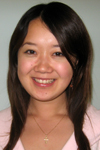A drastic change in scenery may be difficult for some, but Haruka Seki is enjoying every day of it and finding all of the positives. Seki has gone from waking up to Mount Fuji and rice fields in the Japanese countryside to the Mississippi River and squirrels playing in large oak trees in St. Paul.
“I like squirrels. They are cute and not common in Japan. I am happy to see the squirrels running around here free,” Seki said.

Haruka Seki
Seki is a junior exchange student majoring in communications from Yamanashi, Japan. She grew up in the countryside with her parents, older brother and sister, and younger sister. Her siblings had all studied abroad, so Seki decided to as well.
After a study abroad program in Melbourne, Australia, during high school, Seki decided she should try studying abroad again in college. “My year in Australia was not as good as I had expected. I was younger than other students, had difficulty communicating in English, and it was my first time leaving Japan and my family. I was able to enjoy some of it, but knew I had to try it again in the United States.”
The Study Abroad Foundation at Keio (her university in Japan) told her about St. Thomas and its communications program. This connection, and her interest in attending a school without many Japanese students, brought Seki to St. Thomas in March 2009. She then began classes at the ELS Language Center on campus and began as a full-time UST student this fall.
Many things have helped Seki enjoy a positive experience at St. Thomas. “I like how St. Paul has a beautiful environment and does not feel like a big city. It is a calm place, which is great for studying. St. Thomas is very welcoming to international students, with its nice students and professors. I have enjoyed the residence hall life because it is not common in Japan and we are always having get togethers," Seki said. “I feel comfortable here, except for my surprise of how Americans eat grapes. We peel the skins off of grapes in Japan, so I have been trying to get used to that.”
For those students interested in studying abroad, Seki has some advice: “Now is your chance for a great opportunity. Once you are working full time, you may not have the opportunity and you may regret it if you miss out on your chance. I believe that it is worth trying, up to you to make it a great experience, and you need to take the bad and make it positive. I did not expect that it would be so enjoyable and that I would make so many friends, but it has truly been a great study abroad experience.”
This spring, Seki will return to Keio and prepare for graduation in the spring of 2011. Seki will begin looking for jobs after graduation in areas around the world. Although she would like to return to the United States, Seki will be enjoying every day and going wherever life leads her.






